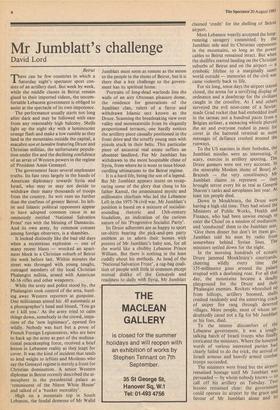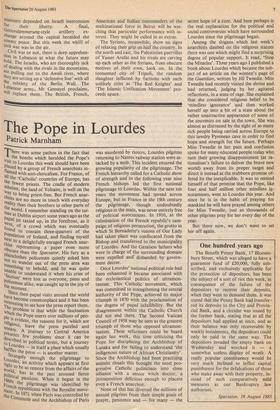Mr Jumblatt's challenge
David Lord
Beirut There can be few countries in which a Saturday night's spectator sport con- sists of an artillery duel. But week by week, while the middle classes in Beirut remain glued to their imported videos, the uncom- fortable Lebanese government is obliged to assist at the spectacle of its own impotence. The performance usually starts not long after dark and may be followed with ease from any reasonably high balcony. Shells light up the night sky with a luminescent orange flash and make a low rumble as they land in the mountains outside the capital, a macabre son et lurniere featuring Druze and Christian militias, the unfortunate popula- tion under fire and the declining confidence of an array of Western powers in the regime of President Amin Gemayel.
The government faces several unpleasant truths. Its fate rests largely in the hands of American diplomacy towards Syria and Israel, who may or may not decide to withdraw their many thousands of troops from the country. Its writ runs no further than the confines of greater Beirut. Its left- ist and Islamic political opponents appear to have adopted common cause in an ominously entitled 'National Salvation Front' run with the blessing of Damascus. And its own army, by common consent among foreign observers, is a shambles.
It looked distinctly like the bad old days when a mysterious explosion — one of many recent blasts — wrecked an apart- ment block in a Christian suburb of Beirut the week before last. Within minutes the street was thronged with young toughs, outraged members of the local Christian Phalangist militia, armed with American M-16 rifles and other weaponry.
While the army and police stood by, the Phalangists took control of the area, hustl- ing away Western reporters at gunpoint. One militiaman aimed his .45 automatic at a photographer's head and hissed, 'You go or I kill you.' As the army tried to calm things down, somebody in the crowd, impa- tient of the 'new legitimacy', opened fire wildly. Nobody was hurt but a posse of French Foreign Legionnaires, who are here to back up the army as part of the multina- tional peacekeeping force, received a brief lesson in Lebanese reality as they leapt for cover. It was the kind of incident that tends to lend weight to leftists and Moslems who say the Gemayel regime is merely a front for Christian domination. A senior Western diplomat in Beirut recently described the at- mosphere in the presidential palace as 'reminiscent of the Nixon White House' and talked of a 'bunker mentality'.
High on a mountain top in South Lebanon, the feudal demesne of Mr Walid Jumblatt must seem as remote as the moon to the people in the slums of Beirut, but it is there that a key challenge to the govern- ment has its spiritual home.
Portraits of long-dead warlords line the walls of an airy Ottoman pleasure dome, the residence for generations of the Jumblatt clan, rulers of a fierce and withdrawn Islamic sect known as the Druze. Scanning the breathtaking view over valley and mountainside from its elegantly proportioned terraces, one hardly notices the artillery piece casually positioned in the front drive and the scruffy young men with pistols stuck in their belts. This particular piece of ancestral real estate suffers an absentee landlord. For Mr Jumblatt has withdrawn to the more hospitable clime of Syria, from where he is wont to issue blood- curdling ultimatums to the Beirut regime.
It is a hard life, being the son of a legend. But Mr Jumblatt appears intent on recap- turing some of the glory that clung to his father Kamal, the assassinated mystic and millionaire chieftain who led the Lebanese Left in the 1975-76 civil war. Mr Jumblatt's position is based on a mixture of socialist- sounding rhetoric and 13th-century feudalism, an indication of the curious nature of his 'Progressive Socialist Party'.
Its Druze adherents are as happy to sport tee-shirts bearing the pick-and-pen party emblem as to adorn their homes with posters of Mr Jumblatt's baby son, for all the world like a chubby Lebanese Prince William. But there is nothing in the least cuddly about his methods. As head of the 'National Salvation Front', a rag-bag coali- tion of people with little in common except mutual dislike of the Gemayels and readiness to daily with Syria, Mr Jumblatt
claimed 'credit' for the shelling of Beirut airport.
Most Lebanese wearily accepted the long- running savagery committed by the Jumblatt side and its Christian opponents in the mountains, so long as the power cables to Beirut remained intact. But when the shellfire started landing on the Christian suburbs of Beirut and on the airport — a symbolic lifeline to a marginally saner world outside — memories of the civil war came violently back to life. For six long, tense days the airport stayed closed, the arena for a terrifying display of ordnance and a deathtrap for the civilians caught in the crossfire. As I and others surveyed the evil nose-cone of a Soviet- made Grad rocket that had embedded itself in the tarmac not a hundred paces from a Belgian airliner, a menacing whistle pierced the air and everyone rushed in panic for cover in the battered terminal as more messages of defiance crashed around the runways.
To the US marines in their foxholes, the Jumblatt missiles were an interesting, if scary, exercise in artillery spotting. The Druze gunners were not very accurate. In the miserable Moslem slums of Bourj Brajneh — the very constituency Mr Jumblatt claims to represent — theY brought terror every bit as real as General Sharon's tanks and aeroplanes last year. At least ten people died.
Down in Moukhtara, the Druze were having a high old time. They had seized the Ministers of Public Works, Health and Finance, who had been unwise enough to enter the Chouf on a mission of mediation, and 'conducted' them to the Jumblatt seat. 'Give them dinner but don't let them go, Jumblatt told his men by radio from somewhere behind Syrian lines. The ministers settled down for the night. In the morning hundreds of ecstatic Druze jammed Moukhtara's courtyards, cheering wildly every time the 155-millimetre guns around the palace erupted with a deafening roar. For all that day, the mountains became a deadly playground for the Druze and their Phalangist enemies. Rockets whooshed up from hilltops, artillery boomed, shells crashed randomly and the unnerving crack of sniper fire rang through deserted villages. More people, most of whom un- doubtedly cared not a 'fig for Mr Jumblatt or his foes, died.
To the intense discomfort of the Lebanese government, it was a tough- talking batch of Israeli troops who finally extricated the ministers. Where the honeyed words of various interested parties had clearly failed to do the trick, the arrival of Israeli armour and heavily armed combat troops succeeded.
The ministers were freed but the airport remained hostage until Mr Jumblatt was persuaded — by whom nobody knows — to call off his artillery on Tuesday. Two lessons remained clear: the government could operate its airport by the grace and favour of Mr Jumblatt alone and its ministers depended on Israeli intercession for their liberty. A final,
GOtterarammerung-style artillery ex- change around the capital heralded the uneasy peace. But this week the whiff of Mil war was in the air.
Civil war or not, there is deep apprehen- sion in Lebanon at what the future may hold. The Israelis, who are thoroughly sick of dealing with the rivals in the mountains, are pulling out to the Awali river, where they are setting up a 'defensive line' with all the subtlety of the Berlin Wall. The Lebanese army, Mr Gemayel proclaims, will replace them. The British, French, American and Italian commanders of the multinational force in Beirut will be wat- ching that particular performance with in- terest. They might be called in as extras.
The Syrians, meanwhile, show no signs of relaxing their grip on half the country. In the north and east, the Palestinian guerrillas of Yasser Arafat and his rivals are carving up each other as the Syrians, from obscure motives of their own, look on. In the tormented city of Tripoli, the random slaughter inflicted by factions with such unlikely titles as 'The Red Knights' and 'The Islamic Unification Movement' pro- ceeds apace.



































 Previous page
Previous page